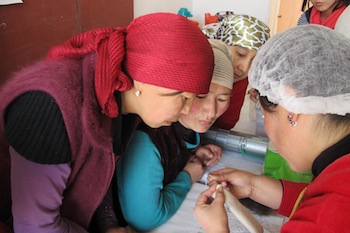Lifestyle Brand MUJI to Develop Local Handicraft Producers in Cambodia, Kenya and Kyrgyzstan
Japanese Retailer MUJI joins BCtA
Published 06-03-13
Submitted by Business Call to Action (BCtA)
 Photo: MUJI
Photo: MUJIJapanese lifestyle brand MUJI has announced the development of an eco-friendly natural dyeing plant in Cambodia, as part as its commitment to the Business Call to Action (BCtA).
The retailer, with international brand presence in nearly 600 stores across Japan, Asia, Europe and the USA, plans to source its products locally and increase the number of local producers, especially women from post-conflict or transitional societies.
MUJI has been promoting eco-friendly dyeing utilizing various natural materials since 2012, and formed its commitment around two projects including the development of a 2,000 m2 eco-friendly dyeing and sewing towel plant in Cambodia to employ over 300 local people by 2015.
MUJI is also planning to plant indigo – a tropical plant cultivated as a source of dark blue dye – around the plant, which will generate 50 new jobs and a new product line of natural Indigo dye products in near future.
Supported by several international organizations and hosted by the UN Development Programme (UNDP), the BCtA is a global initiative that aims to support the private sector’s efforts to fight poverty through its core business.
“BCTA is delighted to engage with MUJI given their unique brand commitment to problem solving through designs, focusing on materials and simple packaging. The fact that they are investing in least developed countries by employing local people, as well as sourcing from artisans from conflict affected regions is certainly part of what makes this commitment so unique and meaningful,” said Sahba Sobhani, Acting Programme Manager, Business Call to Action.
With the support of the Japan International Cooperation Agency (JICA), MUJI plans to continue sourcing soapstone products from Kenya and wool felt products from Kyrgyzstan. By training local producers and engaging artisan communities in these regions, MUJI continues to develop quality products that meet international standards.
MUJI’s focus on design and efficiency will result in more local jobs and wages for local people. In addition, the company will provide skill development seminars for local producers in Kenya and Kyrgyzstan, including how to manage supply chains, keep high quality standards, and monitor sales trends in international market.
MUJI plans to increase production by 8% in Kenya and Kyrgyzstan by 2015 and 1.3 million dollars revenue is expected that year from the sales of products from Cambodia, Kenya and Kyrgyzstan.
MUJI is known for providing simple, innovative and elegant products which comes from the Japanese notion of ‘Kanso’ that brings a sense of calm into everyday life. Operated by Ryohin Keikaku Co Ltd, MUJI also has committed to buying organic cotton from suppliers who engage in sustainable sourcing practice including small scale farmers from Tanzania, Egypt and India.
“MUJI is very honored to join the unique group of BCtA members in its commitment to use simple, high quality and eco-friendly technologies to develop products that will support local producers in developing counties, more sustainable life for our customers, and doing good to the society“ said Kei Suzuki, Director and General Manager, Household Division of MUJI.
For further information, images or an interview please contact:
Ryohin Keikaku: Mizuki Sakuyama, sakuyama@muji.co.jp Tel: +81.3.3989.4410
BCtA: Karen Newman, karen.newman@undp.org, Tel: +1.212.906.5194
About the Business Call to Action (BCtA)
Business Call to Action is a global initiative that challenges companies to develop inclusive business models that offer the potential for development impact along with commercial success. The initiative is the result of a partnership between the Australian Agency for International Development, the Dutch Ministry of Foreign Affairs, the Swedish International Development Cooperation Agency, UK Department for International Development, US Agency for International Development, United Nations Development Programme, the United Nations Global Compact, the Clinton Global Initiative, and the International Business Leaders Forum to meet the Millennium Development Goals by 2015. Companies report on progress toward commitments on an annual basis. www.businesscalltoaction.org, @BCtAInitiative
Ryohin Keikaku Co., Ltd. operates specialty stores, named MUJI (Mujirushi Ryohin). MUJI was born in 1980 as a private brand of the Seiyu with 40 products, has grown into a brand carrying 7,000 products present day. MUJI provides “lifestyle products of beauty, art and taste,” and aims to offer a "simple, elegant and comfortable lifestyle at reasonable prices." Ryohin Keikaku Co., Ltd was established in 1989 and is based in Tokyo, Japan. Since its independence from the Seiyu Ltd., the company has been developing and supplying consumer driven daily necessities including clothing, household goods and food. The company’s basic principle is to develop new, simple products at reasonable prices by making the best use of the materials while considering environmental issues. Ryohin Keikaku has been steady developing its design concept, and the popularity of its products sold under the MUJI brand is spreading worldwide as a global trend originating in Japan. The company has nearly 600 stores in 24 countries and areas, including Japan. ryohin-keikaku.jp/eng

Business Call to Action (BCtA)
Business Call to Action (BCtA)
Business Call to Action is a global joint advocacy platform that works to accelerate progress towards the Sustainable Development Goals (SDGs) by challenging and supporting companies to develop inclusive business models that offer the potential for both commercial success and development impact. It is hosted by the United Nations Development Programme and funded by Dutch Ministry of Foreign Affairs, Swedish International Development Cooperation Agency (Sida), Swiss Agency for Development and Cooperation, UK Department for International Development (DFID). To date, 230 companies from around the world have signed on to commit to contribute to the SDGs, from large multinational companies to national and small- and medium-enterprises in 70 countries.
More from Business Call to Action (BCtA)

